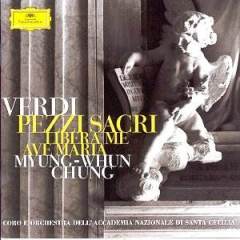Verdi - Pezzi Sacri (Myung-Whun Chung) [2000]
Verdi - Pezzi Sacri (Myung-Whun Chung) [2000]

1 Stabat Mater (1896/97) 2 Laudi Alla Vergine Maria (1896/97) 3 Te Deum (1896/97) 4 Ave Maria (1889) 5 Ave Maria (1880) 6 Ave Maria From "Otello", Act IV (1887) 7 Libera Me, Domine From Messa Per Rossini (1869) Coro E Orchestra Dell'Accademia Di Santa Cecilia Myung-Whun Chung – conductor recorded 9 / 2000 in Auditorio di Via della Conciliazione, Rome.
Following hard on the heels of Riccardo Chailly’s revelatory world premiere recording of early and late sacred music by Verdi (see review last month), Myung-Whun Chung and his Rome forces offer a further recorded performance of the great 1880 Ave Maria for soprano and orchestra. Here, it’s juxtaposed not with the Padre nostro, as Verdi originally intended, but with Desdemona’s ‘Ave Maria’ from Otello.
Chung focuses less than Chailly on the bass strings as they tug in dissonance with the haloed violins: his is a more consoling, less harrowing invocation, with the soprano of Carmela Remigio darker of vowels and less vulnerable of tone. A velvet stole is wrapped around the chill isolation of Desdemona, too, with voice and orchestra singing together in a warm euphony of texture and colour.
This disc, like Chailly’s, also offers the early, preparatory ‘Libera me’ which Verdi wrote for the collaborative Rossini Requiem in 1868. But the Pezzi sacri dominate: those late, austere masterpieces of history’s most devout agnostic. Here Chung’s own sense of awe and deep affection for the score is palpable: these are performances very much in the tradition of his great hero, Carlo Maria Giulini. Their broad pacing and hushed textures need only more intense, less generalised verbal focus to recreate that authentic Verdian ardour to which Chung so sensitively responds.--- Hilary Finch, BBC Music Magazine
Since leaving the Bastille in Paris, Myung-Whun Chung has made his recordings of choral music primarily in Italy, and very welcome these have been. The repertoire has also been slightly off the beaten track, which has made his latest recordings doubly welcome given the high performance and recording standards.
On this release we have a collection of sacred pieces from Verdi, a well known agnostic. Similar composers, (Berlioz springs to mind) have been inspired by the power of the words in liturgical texts without necessarily believing the message behind them. Sometimes an objective view can produce a work just as moving as that written by a believer.
So it proves here with Chung's collection of seven works sung beautifully by the Italian forces. There is a discipline in the singing which might make you suspect that the source of the singing was anywhere other than the land of opera.
The playing of the orchestra cannot be faulted, and the DG recording quality is well up to their usual standard. The acoustic has also been very well managed with a very impressive bloom to the voices and orchestra, sounding for once as though they were recorded together. There is no 4D logo on this issue and so I assume that this technology has not been used here. There is no shortcoming from that quarter.
The first four of these pieces are usually known by their collective name of Quattro Pezzi Sacri and are often performed as such. According to the sleeve note, this was a suggestion made to Verdi by his publisher Ricordi, and was not the intention of the composer. Nevertheless, this title has stuck and with this issue, the formerly semi-rigid arrangement of these pieces is somewhat separated by adding to them a further three works of a very similar nature.
In his later years, Verdi was increasingly drawn to the works of Palestrina, and although there is no unaccompanied polyphony from him, Verdi's religious works are more attuned to this than the operas. Of the three additional works, two of them are Ave Marias, the first written in 1880 for soprano and strings. The soloist here (Carmela Remigo) sings with a very pure voice (albeit with a somewhat wide vibrato), and gives a most impressive performance, ably accompanied by the strings. Opera is not ignored, however as we are also treated to the Ave Maria from Act IV of "Othello"
The last work on the disc is Verdi's contribution to the infamous Messa per Rossini written as a collaborative work by 13 different composers and performed on the first anniversary of the death of Rossini. Verdi reserved the Libera Me for himself, and this setting was used later as the model for the Libera Me in his Requiem Mass. ---John Phillips, musicweb-international.com
download (mp3 @320 kbs):








